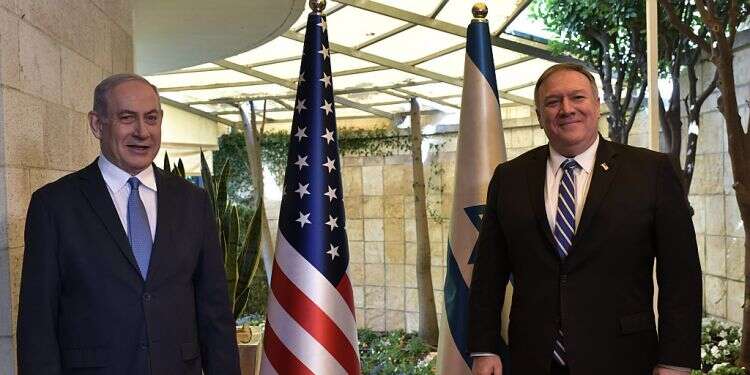US Secretary of State Mike Pompeo left Israel Wednesday evening after a flash visit, during which he met with Prime Minister Benjamin Netanyahu, Blue and White leader Benny Gantz, Mossad Director Yossi Cohen, and Foreign Minister-designate Gabby Ashkenazi.
In a special interview with Israel Hayom – his second this week – Pompeo stressed that Israel is within its right to apply Israeli law to the large statement blocs in Judea and Samaria and the Jordan Valley, as stated in the Trump administration's Middle East peace plan.
Follow Israel Hayom on Facebook and Twitter
He did, however, advise caution with respect to any dealings with China.
Q: You mentioned a lot of issues you are going to raise, and I heard the statement with the prime minister, regarding Iran, regarding the vision for peace. What kind of progress was made today in those meetings, were there any concrete steps that you agreed to take?
"We talked about all of the issues, we expressed our concerns about Chines operations and influence here. ... I spoke with each of them [Gantz and Netanyahu] about that. We also spent time talking about the vision for peace, how they are thinking about moving forward, the role that the united states can play in the region and to support what the Israeli leadership was doing, and we finally spent time talking about the tail end," of the issue.
Q: As you know, the new government is planning to apply Israeli sovereignty in some parts of the West Bank on July 1, and my question is, did you agree, both sides, to do it. Was it the last green light to do it by the US?
"We had a conversation about all the ways to move forward. They, too, are going to have to find their path collectively forward, and I reminded that in the end, this is an Israeli decision. They will have both a right and an obligation to make a decision on how they are going to do that. So that was the scope of the conversation."

Q: So it's Israel's right to do it, and Israel will be backed by the US?
"We talked about how to move the peace plan forward, the vision for peace. We talked about ... a lot of issues around that, how to properly engage with all the parties that are connected to it, and to make sure this is done in a proper way to deliver on the and outcome and vision set forward."
Q: So you agreed to push forward the vision for peace?
"That's right, the prime minister and the speaker, when they were in Washington, both agreed that they would support the president's vision for peace, which means that there is a set of conditions that have been laid out very clearly, and a set of opportunities for the Palestinians to also join to agree to negotiate based on that vision. And we hope that the Palestinians choose to do that as well. It's in the Palestinians best interest, in the Palestinian people's best interest if they would grasp this opportunity."
Q: Since the coronavirus pandemic began, some of the senior PA officials have been accusing Israel of spreading the virus among the population. What is your opinion on that?
"That is unfortunate. We have seen this kind of misinformation used all across the world. I hope that everyone can be responsible. We know where the virus began, it began in Wuhan, China, it is now spread all over the globe and the responsibility for all of us, Israelis, Palestinians to work together to reduce the risk of this pandemic and ultimately deliver on a vaccine."
Q: Are there any concrete steps regarding China that were agreed today with the PM regarding our commercial ties, Israeli commercial ties with China?
"The mission today was not about any specific proposal, but rather to talk about our two countries can work together. Our democracies with thriving technology sectors, we are nations that defend individual liberty and freedom, and we have real opportunity to take what is a fantastic important security relationship to grow that, but also to grow our economic and trade relationship. I think the whole world, Israelis see too, the downside of trading with the Chinese Communist Party, so we can build upon our relationship rather than give the CCP the opportunity to undermine it."
Q: You met the prime minister and speaker Gantz and future foreign minister Ashkenazi. Why are you putting so much effort into meeting all three of them, if the PM is for now is Netanyahu. Why are you bothering to meet the other as well?
"The United States' relationship is broad and deep. I have been involved in this for almost a decade now, I have gotten the chance to meet remarkable Israeli leaders, Knesset members, business leaders from all across. It was really important to me.
"The reason for my trip was to try and get as close as I could to the date of government formation, and I got here a day or so before. But to get here in this important time in Israeli history to remind them of this important relationship, to continue to build on it, to meet not only with PM Netanyahu and the speaker but also with soon to be foreign minister Ashkenazi. We had a great conversation."
Q: Finally, are you going to resume such kind of corona diplomacy, touch and go. Landing and then leaving?
"I don't have any future travel set. I am confident that in the weeks ahead I will continue touring friends and partners, so that we can have a chance even in this difficult time, even in this difficult time to meet face to face, and have important, quite conversations, on how to continue to deliver good outcomes for the American people and our partners."




